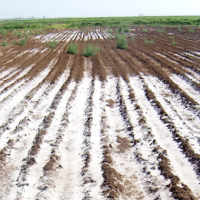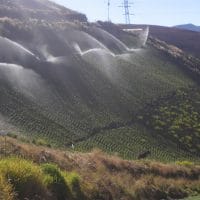-
Soil ecology and capitalism agriculture: Fred Magdoff interviewed by Farooque Chowdhury
Ecological and social conditions are mostly ignored in a system in which profit is the goal: Fred Magdoff discusses capitalist agriculture
-
Amazon women warriors and revolutionary pants
For much of human history, most people—men and women—wore loose fitting robes of various types to cover their bodies. It is thought that trousers were invented relatively recently in human history, around 1000 BCE, so that people could be more comfortable riding horses.
-
The struggle for a just society is long, requiring action on many fronts
‘The struggle for a socially just and ecologically sound society requires activity on many fronts. This includes the crucial work of organizing and activist engagement, as well as education about the economic, political, and ecological complexities that exist and why so many of the problems facing humanity are either caused or made worse by capitalism.’
-
June 2018: reflections on 1988 three decades later
Capitalism as a system functions irrationally because social and ecological concerns cannot be taken into account when making business decisions. Profits before all else.
-
May Day 2018: Exploitation, NO! Expropriation, NO! Unite for justice!
In view of the historic May Day, May 1st, analysts from Monthly Review, the famous independent socialist magazine, identify tasks the working classes should press with. The following interviews were conducted in early April with John Bellamy Foster, Professor and Editor of Monthly Review; Fred Magdoff, Professor Emeritus, and one of Monthly Review’s closest associates; […]
-
The earth shall rise on new foundations
The United States is sometimes viewed as the most extreme capitalist society on earth. The decision of the newly elected Trump administration to withdraw from the Paris Climate Agreement would seem to affirm such a judgment. It highlights the fact that while capitalism cannot solve the environmental problem, a more extreme capitalist society can, if it is not stopped, eliminate all possibility for a future sustainable society, by accelerating the runaway train to catastrophe represented by today’s business as usual.
-
Capitalism is national and imperialist, not transnational
Capitalism is characterized by both centripetal and centrifugal tendencies. There is not and cannot be a transnational capitalist state and for that reason there cannot be a transnational capitalist class.
-
The Problem Is Capitalism
NYC Climate Convergence, September 20, 2014 A. The Environmental Crisis The “environmental crisis” is actually a number of crises, including the following: climate change; acidification of the oceans (related to elevated atmospheric CO2 levels); pollution of air, water, soil, and organisms with harmful substances; degradation of agricultural soils; destruction of wetlands and tropical forests; and […]
-
The Environmental Crisis and Capitalism
Fred Magdoff: What I would end with is just a couple of ideas — not to give you a blueprint of another type of system but a couple of ideas of what it might be like. I would say one in which basically the economy and politics are both under social control, under democratic social […]
-
Farewell Comrade Chávez
With the death of Hugo Chávez, Venezuela and the world have lost a leader whose primary concern was to bring a new system into existence — one he referred to as 21st Century Socialism. This meant a lot of things to Chávez, including making sure that all people had access to the necessities of life […]
-
Reducción de recursos y degradación ambiental: una propuesta modesta
Hay un número importante de personas en los países adinerados que cree que los grandes problemas de la reducción de los recurso con que cuenta el planeta y la contaminación ambiental global, son causados principalmente por la enorme cantidad de habitantes que tiene el mundo: actualmente más de 7 mil millones, y que esta […]
-
Reducing Resource Use and Environmental Degradation: A Modest Proposal
There are significant numbers of people in the wealthy countries who believe that the great issues of resource depletion and global environmental pollution are caused primarily by the huge number of people on the globe — currently about 7 billion — and that things will only get much worse with the anticipated increase to about […]
-
Lessons from a Long History of Dissent: From the Early Twentieth Century to Occupy Wall Street
World Peace Forum Teach-In, Vancouver, Canada, November 12, 2011 (Modified from Notes) We are at what social theorists call a “historic moment,” in which real change suddenly seems possible. It is therefore all the more important to learn from past struggles. One of the first lessens of a long history of dissent from the early […]
-
OWS Movement: A Down-to-Earth View
A participant’s note from Burlington. . . . I went to OWS (a week ago) and Occupy Burlington last Saturday. I was VERY happy that, while it was the last day of the regular weekly farmers’ market at the same small park, the farmers gave the Occupy Burlington people $400 worth of tokens to buy […]
-
The Great Recession and Its Aftermath: Causes vs. Symptoms
There is much confusion about the current economic situation, among left media and organizations as well as in the mainstream media. This is certainly understandable given its complexity. But what many are referring to as causes are symptoms of a deeper underlying problem — in other words, sparks that produced the Great Recession by igniting […]
-
The Financial Crisis of Capitalism
“Our community is expanding: MRZine viewers have increased in number, as have the readers of our editions published outside the United States and in languages other than English. We sense a sharp increase in interest in our perspective and its history. Many in our community have made use of the MR archive we put […]
-
Reflections on Venezuela: Food, Health, Democracy, and a Hope for a Better World
Written hurriedly in Caracas February 2008 Background These are some brief impressions and reflections in the midst of a short visit to Venezuela. For 10 days I traveled with a wonderful group of 23, mainly from the New York City area (with delegates from Washington, DC, Washington State, and myself from Vermont). It was led […]
-
Reflections on the June 9-10, 2006 Hong Kong Conference: “The Fortieth Anniversary: Rethinking the Genealogy and Legacy of the Cultural Revolution”
Flying into Hong Kong with my wife, Amy Demarest, early in the morning of June 8, 2006 and jetlagged, I wasn’t sure I’d be up to the next two days of a fully packed conference on the Cultural Revolution. The conference was sponsored by the China Study Group, Monthly Review, and the Contemporary China […]







